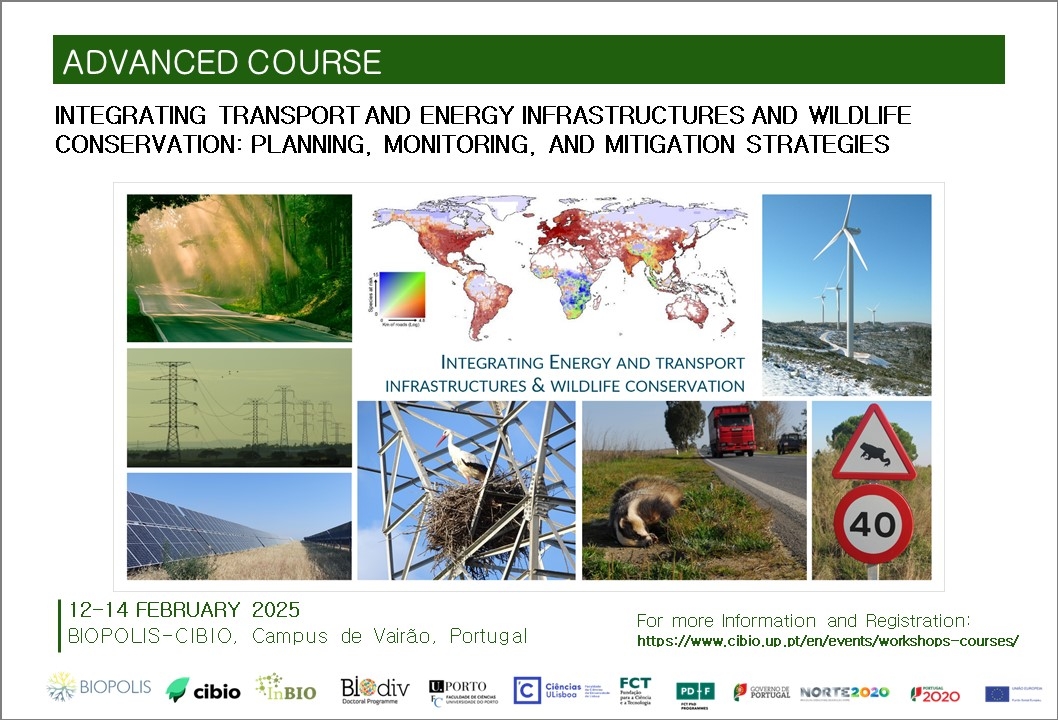Integrating transport and energy infrastructures and wildlife conservation: Planning, Monitoring, and Mitigation Strategies
From 12 Feb 2025 until 14 Feb 2025 - BIOPOLIS-CIBIO, Vairão, Portugal (Face-to-face)

This course explores the dynamic intersection of infrastructure development and wildlife conservation. Students will learn to balance transport and energy infrastructure development needs with ecological preservation through strategic planning, effective monitoring, and innovative mitigation techniques. Compensation measures will also be discussed. The curriculum covers the environmental impacts of onshore infrastructure (roads, railways, powerlines, wind farms, and solar photovoltaic plants), wildlife habitat requirements, and the application of technology in monitoring and mitigating negative effects. By integrating theoretical knowledge with practical skills, this course aims to prepare students for careers in environmental planning, conservation, and sustainable development, as well as to foster future research on this topic.
PROGRAM
This course outlines the strategies for an ecologically sustainable development of different types of transportation and energy infrastructures such as roads, powerlines, wind turbines, and solar photovoltaic plants. The course encompasses modules that outline the steps to plan projects, evaluate impacts, and mitigate or offset any unavoidable impacts. The program schedule is as follows:
Day 1
Current infrastructure development and projections in the EU and worldwide
Impact of transport and energy infrastructure development on wildlife and ecosystems
National and international legislation on Strategic Environmental Assessment and Environmental Impact Assessment
Day 2
Strategic planning, mitigation and compensation strategies
Monitoring techniques to assess impacts and mitigation effectiveness
Analytical tools, methods and technologies for monitoring and assessing the impact of infrastructure and mitigation on wildlife populations.
Day 3
Practice session - data requirements and user-friendly analytical tools to assess the risk and impact on wildlife mortality and to estimate maps of risk.
CALENDAR
3 days - 18 hours - Schedule: 09:30 - 12:30 & 14:00 - 17:00
12 February to 14 February, 2025
COURSE INSTRUCTORS
Coordination
Clara Grilo | BIOPOLIS-CIBIO
Joana Bernardino | BIOPOLIS-CIBIO
Instructors
Tomé Neves | BIOPOLIS-CIBIO
Ana Ceia Hasse | BIOPOLIS-CIBIO
Ana Teresa Marques | BIOPOLIS-CIBIO
Ricardo Martins | BIOPOLIS-CIBIO
SELECTION CRITERIA
The course will be open to a maximum number of 25 participants.
75% of available student slots are reserved for BIODIV students.
Priority will be given to:
• 1st year and other PhD students attending the BIODIV Doctoral Program;
• PhD students attending other courses;
• Other post-graduate students and researchers.
(A minimum number of participants is required for the course to take place)
APPLICATION
Deadline: 20 January 2025
To apply fill the FORM
A copy of the form will be sent to the email address you provide as proof that you have successfully submitted your application. Results will be emailed to you within 8 working days of the application deadline.
REGISTRATION
65€ (students) | 100€ (other participants).
BIOPOLIS/ CIBIO members will have an additional discount of 20%. Participation is free of charge for BIODIV Students MBGE 1st year Students & CIBIO's TwinLabs
(If applicable, payment will be made to Associação BIOPOLIS - VAT No. 516033727. Information on the payment amount and the payment deadline will be sent together with the results notification, and a proforma invoice may be issued in due time).
MORE INFORMATION
Registration fees do not include accommodation or meals.
No ECTS credits are awarded for attending the course. Participants receive a certificate of attendance without quantitative evaluation.